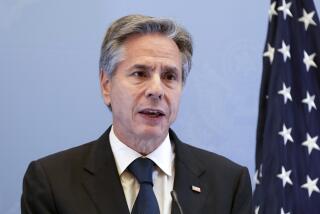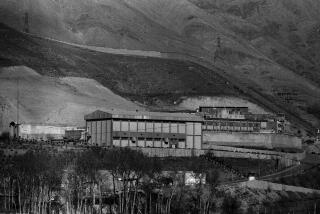THE IRAN-CONTRA HEARINGS : Excerpts: Americans Will Be Home
- Share via
\o7 WASHINGTON\f7 — Following are excerpts from testimony Tuesday by Robert C. McFarlane, President Reagan’s former national security adviser, to the congressional committees investigating the Iran-contra affair:
Missile Decision
(House panel chief counsel John W. Nields Jr. asked McFarlane who authorized the United States to replace Hawk missiles that Israel sent to Iran as part of a hostage deal.)
Answer: Well, bear in mind that the Defense Department, the secretary was fully aware of the fact that the President had approved the authority for Israel to make such shipments, in the understanding they would then come to the United States to purchase replacements . . . . I guess I’m saying that it’s quite true that it would have been essential that the Cabinet officers take part in the decision. Once taken, its implementation could have been handled by subordinates, even, but there was no question in the secretary’s mind that, while he was against it, the President had approved the policy.
(Nields asked McFarlane about the specific terms of the arms-for-hostages exchange.)
Question: Then it (a document) refers to dispatching a covert hostage debrief team to Wiesbaden (West Germany, where the United States has a large military base and hospital). And . . . there is the distinct possibility that, at the end of the week, we will have five Americans home and the promise of no future hostage takings in exchange for selling the . . . 120 Hawks?
A: Yes.
Q: Now my question to you, Mr. McFarlane, is: Isn’t it true that you were aware of the fact that there was an incipient exchange of Hawk missiles for American hostages?
A: I think I was certainly hopeful. I didn’t give it more than about a 20% probability, but yes, hopeful.
Q: And you communicated that in Geneva to the President, did you not?
A: Yes.
Q: You told him that the Israelis were shipping weapons and that there was hope that the hostages would come out by the end of the week.
A: Yes.
(McFarlane denied that Reagan discussed a contribution to the contras with King Fahd of Saudi Arabia during a private talk.)
A: I had no reason for knowing whether it came up in the conversation that he had had. And apparently there may have been some ambiguity in what I said yesterday on that score. I didn’t intend to imply that in the meeting the President raised this issue with the head of state of the other government. I know for a fact he did not.
Q: And how is it that you know for a fact he did not?
A: Because I had occasion to check on this when I was asked about it six weeks ago . . . . And all I knew, or my basis for knowing, was the debrief that I got at the end of the meeting from the President, in which he made no mention of this subject having come up. And so, based on that, my own opinion was he did not.
Role in Transaction
(House minority counsel Richard Leon asked McFarlane why he participated in an arms-for-hostages swap.)
Q: I believe your testimony earlier today in response to Mr. Nields’ questions was that you had reached the conclusion prior to or very shortly after you had arrived in Geneva that it was a Hawks-for-hostages transaction.
A: Yes.
Q: I believe you’ve also testified that, when you met Mr. (Manucher) Ghorbanifar (a middleman in the arms deal), just a matter of weeks later--three or four weeks later over in London--that you were personally repulsed by not only him but his attitude of the idea of exchanging hostages for a certain number of TOW missiles or certain types of weapons. Is that right?
A: Yes.
Q: How is it that your attitude changed that dramatically in only six weeks, between being willing to proceed on a Hawks-for-hostages basis on the one hand, and on the other hand, six weeks later being repulsed by someone suggesting the very type of deal for the future?
A: . . . It did seem to me from the original shipment of TOWs that the enterprise had lapsed into a very narrow (arms-for-hostages) exchange . . . . But, when I found out, that’s when I came to the conclusion that this is not going to work. And I think, really, as soon as I did find out, that’s what I decided and urged the President to discontinue it.
sg
(Sen. Paul S. Sarbanes (D-Md.) asked a more general question about McFarlane’s conduct.)
Q: In all of this, who or what were you trying to shield or protect?
A: Very likely myself, my reputation, my own record of performance.
Q: And only that?
A: Well, I believe, Sen. Sarbanes, that President Reagan’s motives and direction to his subordinates throughout this enterprise have always been in keeping with the law and national values. I don’t think he is at fault here; if anybody is, I am.
More to Read
Sign up for Essential California
The most important California stories and recommendations in your inbox every morning.
You may occasionally receive promotional content from the Los Angeles Times.










